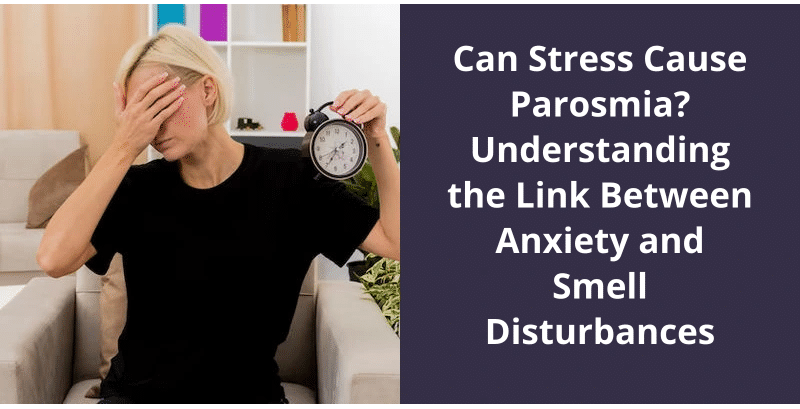Yes, stress can potentially lead to Parosmia. Parosmia is a condition that alters your sense of smell, causing you to perceive odors in a distorted or unpleasant way. The connection between stress and Parosmia lies within the brain where both physical and emotional stress can impact the nerves related to smell. When the body is under stress, it can disrupt normal functioning and potentially cause changes in your perception of smell. This can result in the development of Parosmia. However, it’s important to note that more research needs to be conducted to fully understand this connection. Always consult with a healthcare professional if you’re experiencing persistent issues with your sense of smell.

Is Parosmia a Neurological Disorder?
The exact cause of parosmia remains unknown, but it’s believed to be associated with damage or changes in the olfactory system, specifically the neurons responsible for processing smell. These changes may result from a number of factors, including infections, trauma to the head, exposure to certain medications, or degenerative diseases such as Parkinsons. Additionally, parosmia may develop as a result of changes in brain chemistry, such as those seen in depression or anxiety disorders.
Other research has focused on the possible link between parosmia and multiple sclerosis (MS). MS is a disease that affects the nervous system and can result in a wide range of symptoms, including changes in vision, muscle weakness, and difficulty with coordination. Some studies have suggested that parosmia may be more common in people with MS than in the general population, although this link remains somewhat controversial.
More research is needed to better understand the causes of parosmia, as well as to develop effective treatments for those who suffer from this often-debilitating condition. In the meantime, individuals who experience parosmia may benefit from working with a healthcare professional to identify possible triggers and to develop coping strategies to manage their symptoms.
Understanding the causes of parosmia is important in determining the best course of action to alleviate the symptoms and prevent it from becoming a permanent condition. While parosmia may happen due to various factors, being aware of the possible root causes can help individuals seek appropriate treatment and reduce the impact of this olfactory disorder on their daily lives.
What Causes Parosmia?
One of the most common causes of parosmia is bacterial or viral infections. These infections can damage the olfactory nerves that are responsible for transmitting smell signals to the brain. As a result, the brain receives distorted signals, which can result in a distorted sense of smell. In some cases, the infections can even lead to permanent damage to the olfactory nerves, resulting in permanent parosmia.
Neurological conditions such as Parkinsons disease, Alzheimers disease, and multiple sclerosis can also cause parosmia.
In many cases, parosmia is temporary and goes away on it’s own. However, in some cases, it can be permanent. Treatment options for parosmia depend on the underlying cause and may include medication, surgery, or other treatments. In some cases, people with parosmia may benefit from working with a smell therapist who can help them identify and adapt to the distorted smells they’re experiencing.
Source: Parosmia (Distorted Smell): Causes, Symptoms & Treatment
If you’ve been experiencing changes in your sense of smell lately, it’s important to consider the possibility of parosmia. This condition can lead to a wide range of symptoms, such as difficulty detecting certain scents, smelling foul odors, and finding previously pleasant aromas unbearable. In this article, we will take a closer look at parosmia, it’s causes, and treatment options.
How Do I Know if I Have Parosmia?
Parosmia is a medical condition that results in changes to the sense of smell, making things around you smell different, usually for the worse. It occurs when there’s damage or interference to the olfactory system, which is responsible for detecting odors. While parosmia can be temporary, it can also be a chronic condition, and it can seriously affect an individuals quality of life.
The most common symptom of parosmia is the strong, unpleasant odor that often occurs when the individual is exposed to food. It’s possible to smell a wide range of intensely unpleasant smells, including burning, chemicals, sewage, or rotten eggs. This can make eating incredibly difficult, and over time, this can lead to weight loss or malnutrition. Some individuals also have trouble detecting certain scents in their environment, which can make it difficult to spot potentially hazardous smells, such as gas leaks or fire.
For example, someone who used to love the smell of freshly brewed coffee might now find it unbearable. This can be extremely disorienting and cause anxiety and depression, as the individual must now avoid situations or places where they might be exposed to the smells that make them feel sick.
Unfortunately, there’s no known cure for parosmia. However, some people may experience an improvement over time, particularly if the underlying cause is treated. For example, if the cause of parosmia is a viral infection such as COVID-19, there’s a chance that the sense of smell will return to normal once the infection has subsided.
If you suspect that you might have parosmia, it’s essential to seek medical advice. Your doctor can carry out a thorough examination and determine if there’s an underlying issue that’s responsible for the changes to your sense of smell. They can also offer advice on managing the condition, such as avoiding triggers and managing your diet to ensure you get the necessary nutrients.
It can be an incredibly challenging condition to live with, as it affects every aspect of your life, from eating to socializing. Seeking medical help is crucial to managing the condition and improving your quality of life.
Conclusion
Similarly, stress and it’s associated effects on the body and mind can also contribute to the development of parosmia, a distortion of the sense of smell where familiar scents are perceived differently. Although the exact mechanisms behind parosmia and stress remain unclear, it’s believed that stress can exacerbate existing olfactory disorders or trigger new ones. Furthermore, stress may also interfere with the brain's ability to process smell information correctly, leading to distorted perceptions and false interpretations.





